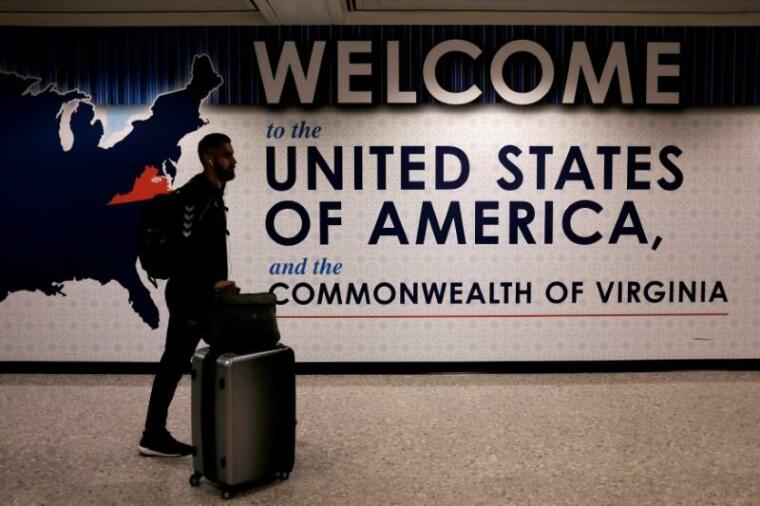U.S. Supreme Court temporarily allows implementation of Trump's travel ban

The U.S. Supreme Court has temporarily lifted the restrictions imposed by a lower court on the implementation of President Donald Trump's order barring refugees seeking entry to the country.
On Monday, Supreme Court Justice Anthony Kennedy issued a short-term order that puts a hold on a federal appeals court ruling last week that would have allowed refugees to enter the U.S. if a resettlement agency had agreed to help them.
The Trump administration said in its emergency motion on Monday that the federal court ruling, which was supposed to take effect on Tuesday, would have allowed up to 24,000 additional refugees into the country.
The Justice Department stated that the ruling "will disrupt the status quo and frustrate orderly implementation of the order's refugee provisions."
In June, the high court ruled that the travel ban, which imposed a 120-day ban on refugees and barred travelers from Iran, Libya, Somalia, Sudan, Syria and Yemen for 90 days, could not be applied against refugees who had "a bona fide relationship with a person or entity in the United States."
In its latest filing, the government argued that resettlement agencies do not deal directly with refugees until they enter the country. The agencies only have agreements with the federal government, which, in turn, deals with the refugees.
"An assurance agreement does not create any agreement whatsoever with the refugee," the Justice Department stated, according to NBC News.
Kennedy's temporary order would give the full Supreme Court time to consider the merits of the government's emergency request. The high court is scheduled to hear arguments on Trump's overall travel ban on Oct. 10 to determine whether the president had the authority to impose his executive order in the first place.
The administration had reportedly decided not to challenge another part of the appeals court ruling that granted exemptions to grandparents, aunts, uncles and cousins of legal U.S. residents from the travel ban. In June, the government said that only parents, parents-in-law, spouses, fiancés, children, and children-in-law of Americans would be granted visas while the travel ban is in effect.
The temporary visa ban is set to expire in late September, while the refugee ban will lapse in late October. The Trump administration had stated that the temporary ban would give officials time to assess U.S. vetting procedures and would address the risk that terrorists could slip into the country.
Trump's order was blocked by lower courts, which argued that the administration had overstepped its authority and had unconstitutionally targeted Muslims.
 Christians don't have to affirm transgenderism, but they can’t express that view at work: tribunal
Christians don't have to affirm transgenderism, but they can’t express that view at work: tribunal Archaeology discovery: Medieval Christian prayer beads found on Holy Island
Archaeology discovery: Medieval Christian prayer beads found on Holy Island Presbyterian Church in America votes to leave National Association of Evangelicals
Presbyterian Church in America votes to leave National Association of Evangelicals Over 50 killed in 'vile and satanic' attack at Nigerian church on Pentecost Sunday
Over 50 killed in 'vile and satanic' attack at Nigerian church on Pentecost Sunday Ukrainian Orthodox Church severs ties with Moscow over Patriarch Kirill's support for Putin's war
Ukrainian Orthodox Church severs ties with Moscow over Patriarch Kirill's support for Putin's war Islamic State kills 20 Nigerian Christians as revenge for US airstrike
Islamic State kills 20 Nigerian Christians as revenge for US airstrike Man who served 33 years in prison for murder leads inmates to Christ
Man who served 33 years in prison for murder leads inmates to Christ


 Nigerian student beaten to death, body burned over ‘blasphemous’ WhatsApp message
Nigerian student beaten to death, body burned over ‘blasphemous’ WhatsApp message 'A new low': World reacts after Hong Kong arrests 90-year-old Cardinal Joseph Zen
'A new low': World reacts after Hong Kong arrests 90-year-old Cardinal Joseph Zen Iran sentences Christian man to 10 years in prison for hosting house church worship gathering
Iran sentences Christian man to 10 years in prison for hosting house church worship gathering French Guyana: Pastor shot dead, church set on fire after meeting delegation of Evangelicals
French Guyana: Pastor shot dead, church set on fire after meeting delegation of Evangelicals ‘Talking Jesus’ report finds only 6% of UK adults identify as practicing Christians
‘Talking Jesus’ report finds only 6% of UK adults identify as practicing Christians Mission Eurasia ministry center blown up in Ukraine, hundreds of Bibles destroyed: 'God will provide'
Mission Eurasia ministry center blown up in Ukraine, hundreds of Bibles destroyed: 'God will provide' Church holds service for first time after ISIS desecrated it 8 years ago
Church holds service for first time after ISIS desecrated it 8 years ago Burger King apologizes for 'offensive campaign' using Jesus' words at the Last Supper
Burger King apologizes for 'offensive campaign' using Jesus' words at the Last Supper Uganda: Muslims abduct teacher, burn him inside mosque for praying in Christ’s name
Uganda: Muslims abduct teacher, burn him inside mosque for praying in Christ’s name